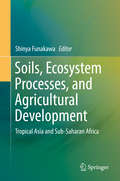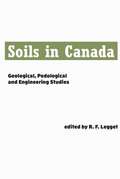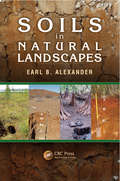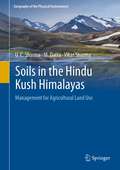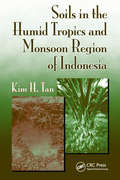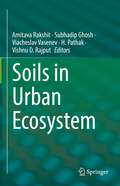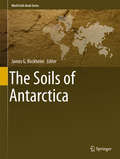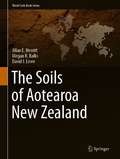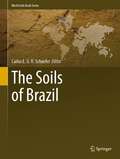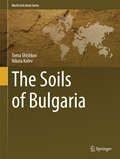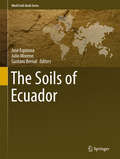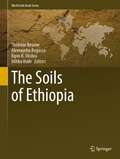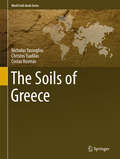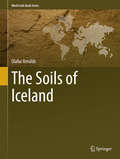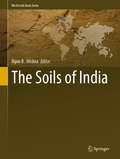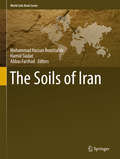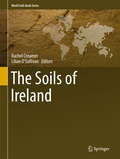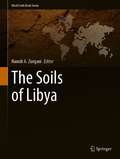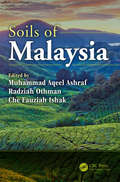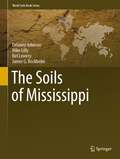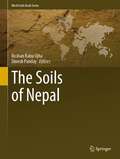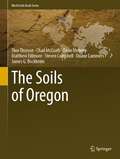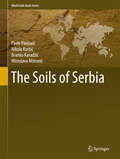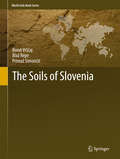- Table View
- List View
Soils, Ecosystem Processes, and Agricultural Development
by Shinya FunakawaThe main objective of this book is to integrate environmental knowledge observed in local agriculture, based on the understanding of soils science and ecology, and to propose possible technical solutions and a more integrated approach to tropical agriculture. The chapters describe and analyze the ecological and technical countermeasures available for mitigating environmental degradation due to the increasing agricultural activities by humans, based on our scientific understanding of traditional agriculture in the tropics. This is an effective approach, as such ecological and technical tools previously involved in traditional activities are expected to be easily incorporated into present agricultural systems. The book starts with a rather classical pedological issue and analyzed traditional agricultural practices with different resource management strategies in terms of their modification of natural biological processes. It focuses on the present situation of tropical agriculture; that is, resource utilization in modern agriculture after application of technical innovation (increased application of chemical fertilizers as well as agricultural chemicals). Here, possible technical approaches to resource management that reasonably support agricultural production whilst mitigating environmental degradation are discussed. The negative impacts of agricultural development on our environment are rapidly growing, yet we are increasingly dependent on the agricultural sector for food and energy. The situation is similar in the tropics, where subsistence agriculture with low input management has long comprised most agricultural systems. Comparison of ecological and/or agronomical studies between different continents are still rare; therefore, this analysis may help clarify what is an essential problem when considering technical transportation beyond continents and/or between temperate and tropical regions.
Soils in Canada: Geological, Pedological and Engineering Studies (The Royal Society of Canada Special Publications #3)
by Robert LeggetThis work originated in a Symposium forming part of the programme for Section IV (Geological Sciences including Mineralogy) of the Royal Society of Canada, which met at Queen's University, Kingston, in 1960. Of wide scope, it demonstrates the progress now being made in Canada in the study of its vast area of soils. The papers of this Symposium are unique in that they present for the first time a combined picture of three aspects of soil science–the geological, the pedological (or agricultural), and the engineering (known as Soil Mechanics). The book serves, of course, mainly as an introduction to a large subject, but some more detailed papers give an idea of the depth as well as the wide range of soil studies in Canada today. The contents can be summarized as follows. First come seven papers on Pleistocene geology in Canada, followed by a study of muskeg (which forms half a million square miles of Canada's surface) and one of soil mineralogy. Four papers–one general and three regional–of pedological interest follow. Finally come four papers on soil mechanics: one relating agricultural and engineering soil studies; one discussing geology's influence on the siting and building of airports; a detailed account of the properties of Leda clay; and a general review of the soil problems facing the Canadian civil engineer.
Soils in Natural Landscapes
by Earl B. AlexanderIn any complete investigation of terrestrial ecosystems, rocks and soils must be considered. Soils are essential resources, providing water and nutrients for vascular plants, and mitigating the flow of water from the land. In addition, soil diversity is critical for biotic diversity. While there are many references on the agricultural perspective o
Soils in the Hindu Kush Himalayas: Management for Agricultural Land Use (Geography of the Physical Environment)
by U. C. Sharma M. Datta Vikas SharmaThis book focuses on the nature and properties of soils of Hindu Kush-Himalayas and their management for agricultural land use. It discusses all aspects of climatic variations and potential of resources in the Himalayan region including examples from Afghanistan, Bangladesh, Bhutan, China (Tibet), India, Myanmar, Nepal and Pakistan. Chapters cover the geology of the parent material of native soils, soils microbes, flora and fauna. Soil classification has been given in detail to better understand the nature of soils for judicious management strategies. The authors present land use practices and suggestions for changes in land use to benefit from the full potential of the soils in this region. Their ultimate aim is to find ways of feeding the ever-increasing population and raising the standard of life for the people living in the Himalayan mountain region.
Soils in the Humid Tropics and Monsoon Region of Indonesia (Books in Soils, Plants, and the Environment)
by Kim H. TanHighlighting the vast differences in tropical climate, from hot and humid to cool and arctic, Soils in the Humid Tropics and Monsoon Region of Indonesia explores the climate, soil zones, and altitudinal variation in soil formation. The author explores the changes in geomorphology, especially in climate and vegetation above sea level, that ha
Soils in Urban Ecosystem
by Amitava Rakshit Subhadip Ghosh Viacheslav Vasenev H. Pathak Vishnu D. RajputThis book is a compilation of latest work in the field of urban soil management. It explores the global status of urban soils and puts forwards methods for sustainable utilization of urban soils and green spaces.Urban soil study is a new frontier of soil science. Urban soils research is challenging due to complexity of classification, spatial-temporal variability, exposure to pollution and the predominant effect of the anthropogenic factor on soil formation. Management of urban soils and green spaces is an important aspect for developing sustainable spaces. This is a comprehensive collection of information for the students, researchers, landscape architects understanding and maximizing the benefits of soils in urban ecosystems.
The Soils of Antarctica
by James G. BockheimThis book divides Antarctica into eight ice-free regions and provides information on the soils of each region. Soils have been studied in Antarctica for nearly 100 years. Although only 0. 35% (45,000 km2) of Antarctica is ice-free, its weathered, unconsolidated material qualify as "soils" Soils of Antarctica is richly illustrated with nearly 150 images and provisional maps are provided for several key ice-free areas.
The Soils of Aotearoa New Zealand (World Soils Book Series)
by Allan E. Hewitt Megan R. Balks David J. LoweThis book offers an introduction to the soils of Aotearoa New Zealand, structured according to the New Zealand soil classification system. Starting with an overview of the importance and distribution of New Zealand soils, it subsequently provides essential information on each of the 15 New Zealand soil orders in separate chapters. Each chapter, illustrated with diagrams and photographs in colour, includes a summary of the main features of the soils in the order, their genesis and relationships with landscapes, their key properties including examples of physical and chemical characteristics, and their classification, use, and management. The book then features a chapter on soils in the Ross Sea region of Antarctica and concludes by considering New Zealand soils in a global context, soil-formation pathways, and methods used in New Zealand to evaluate soils and assist in land-management decisions. Information about how to access detailed information via links to the Manaaki Whenua Landcare Research website is also included.
The Soils of Brazil (World Soils Book Series)
by Carlos E. G. R. SchaeferThis book represents the first comprehensive edition, in English, on the soils of Brazil, in the challenge of illustrating all the biomes of a country of truly continental dimension. In addition to presenting the first geosystemic view of Brazilian soils, in all geological, geomorphological and environmental aspects, the book also makes a key contribution to the discussion of current topics in Pedology, such as Anthrosols, Technosols, Soil Management trends and sustainability, Pedometrics and advanced techniques of digital soil mapping. The soils of Brazil were conveniently stratified into sectors and treated within the different biomes, without neglecting any area of the Brazilian territory. Considering the aspects of the landscape of occurrence, climates, geomorphology and geology, each pedological region was abundantly documented with soil profile data and many fine original, three-dimensional illustrations and diagrams, made with care by the authors. Among the regions, the most important are the forested Amazon, the Central Plateau with Cerrados, the Caatingas of the northeastern semi-arid region, the Atlantic Forest in all known variants; in addition, the Restingas, Mangroves, Oceanic Islands, Wetlands of the Pantanal and the subtropical regions of the Pampa and Matas de Araucaria. The book is of great importance as the first published work on Brazilian soils, but it is of great interest to geologists and geomorphologists who study the tropics and subtropics, due to the novelty and scope of the work.
The Soils of Bulgaria
by Toma Shishkov Nikola KolevThe Soils of Bulgaria offers a comprehensive analysis of the characteristics of soils and concepts on their magnitude. The purpose of the book is to introduce readers to the soil problematic and ecology in Bulgaria. The volume is divided into 3 parts. The first includes historical facts on soil research in Bulgaria, as well as general conditions and factors of soil formation, while the second applies an original pedological approach. The book's third part focuses on essential information concerning land use/cover in Bulgaria. Each of the 13 chapters deals more specifically with fundamental chemical and physical soil properties, concepts of soil evolution, old and modern processes, geographic distribution, climatic conditions, topography, parent materials, plant associations, morphology and the relationship with different classification systems. The interactions between soil status and management are also highlighted. The use of the latest, statistically significant data ensures precise conclusions. The book also includes a large number of charts and new illustrations. The Soils of Bulgaria is crucial reading material for anyone interested in soil management and agriculture in Easter Europe, from students to policy makers and is also of particular interest for researchers in the field.
The Soils of Ecuador
by José Espinosa Julio Moreno Gustavo BernalThis is the first book to comprehensively discuss Ecuadorian soils. Richly illustrated, it provides information on the unique characteristics and distribution of these soils. Due to the influence of the Andes, which vastly modified the climate and parental materials, a relative small country like Ecuador has a wide variety of soil orders, rarely found in other countries. The country is divided into three distinctive regions by the Andes: The Coastal Plain, the Andean Highlands, and the Amazonia Region each with different soil development, influenced by the varying conditions in that region. It is also necessary to consider the Galapagos Islands as a separate region with a particular climate and parental material.
The Soils of Ethiopia (World Soils Book Series)
by Sheleme Beyene Alemayehu Regassa Bipin B. Mishra Mitiku HaileThis book addresses Ethiopia's extremely rich soil diversity and resources, which have developed under various climatic conditions. Featuring contributions by a group of respected experts on Ethiopian soils and agriculture, it provides comprehensive information on the management approaches needed for sustainable soil utilization and conservation under such conditions and the attendant challenges. It offers a valuable resource for anyone interested in soils and agriculture in Ethiopia, but also in other African countries with similar climatic conditions. The book contains 13 chapters which illustrate the long history of knowledge and soil research; climate; geology and geomorphology; soil forming factors, processes, and classification; major soil types, their properties, fertility status, and management; land evaluation and land use planning; soils and society/industry; and future/emerging soil issues.
The Soils of Greece
by Nicholas Yassoglou Christos Tsadilas Costas KosmasThis book presents a comprehensive and up-to-date overview on soils of Greece. It includes sections on soil research history, climate, geology, geomorphology, major soil types, soil maps, soil properties, soil classification, soil fertility, land use and vegetation, soil management, soils and humans, soils and industry, future soil issues. The book summarizes what is known about the soils in Greece in a concise and highly reader-friendly way.
The Soils of Iceland
by Olafur ArnaldsIn this new volume in the World Soil series, the various types of Icelandic soils, their different characteristics, their formation, degradation and erosion are reviewed. At the same time, the book also deals with the agriculture and land use in general to give a complete view of Icelandic soils. The first part details the natural parameters such as the climate and the geography of Iceland. It also explains Icelandic geology, which is the major parameter controlling the soil formation in this country. The author describes the formation of Iceland, the main volcanic systems, central volcanoes, tephra production and its influence on the soils. Explanations on rocks, glaciers, rivers and other main geologic features are also given. The book continues with a description of the Icelandic geomorphology, giving insights on the main surface types, frost, cryoturbation and other cryogenic features. Then it details the different types of soils, their formation and main features, comparing the Icelandic soils to other soils elsewhere in the world. Erosion and land degradation are then reviewed, including the exceptionally active wind erosion and dust production. Finally, it gives an insight on land use, agriculture and vegetation types. All this accompanied by the most amazing photos to illustrate the great diversity of Icelandic Soil.
The Soils of India (World Soils Book Series)
by Bipin B. MishraThis book provides an overview of the diversified soil regimes in India. In addition to the historical advances in soil research and its limitations, it describes the monitoring of various soil conditions and soil uses to improve productivity. Discussing topics such as climate, geology and geomorphology, major soil types and their classification, soil mineralogy and clays, soil micromorphology, soil biogeochemistry, benchmark soils, land evaluation and land use planning, soil health and fertility and soil resilience, the book highlights the multiple uses of soils in industry, human health care, mitigation of challenges due to climate change and construction. It also presents measures for a brighter future of soil science in India, such as imposing organic farming principles toward sustainable agriculture in the context of the second green revolution besides alleviating the poverty and providing the employment opportunities among the farming communities in India.
The Soils of Iran (World Soils Book Ser.)
by Mohammad Hassan Roozitalab Hamid Siadat Abbas FarshadThis unique book addresses Iran’s extremely rich soil diversity and resources, which have developed under various climatic conditions ranging from dry to humid conditions. Featuring contributions by a group of respected experts on Iranian soils and agriculture, it provides comprehensive information on the management approaches needed for sustainable soil utilization and conservation under such conditions, and the attendant challenges. As such, it offers a valuable resource for anyone interested in soils and agriculture in Iran, but also in other Middle East and North African countries with similar climatic conditions. The book contains 14 chapters which illustrate the long history of indigenous knowledge and soil research, climate, geology and geomorphology, vegetation cover, soil forming factors and processes, major soils, properties and their classification. Furthermore, it presents past climate change and paleosols, agroecological zones, soil fertility, soil biology and biotechnology, human induced land degradation and “soil management in space and time”. In the end, major challenges facing the soil resources of the country are defined and recommendations are made to face the future challenges.
The Soils of Ireland (World Soils Book Ser.)
by Rachel Creamer Lilian O’SullivanThis book provides a comprehensive overview of pedology in Ireland. It describes the main soil types of the country, their functions, ecological use, and the conditions to which they were subjected associated with management over time. In addition, it presents a complete set of data, pictures and maps, including benchmark profiles. Factors involved in soil formation are also discussed, making use of new, unpublished data and elaborations. The book was produced with the support and sponsorship of Teagasc, The Agriculture and Food Development Authority, Ireland and the Irish Environmental Protection Agency.
The Soils of Japan (World Soils Book Series)
by Ryusuke Hatano Hitoshi Shinjo Yusuke TakataThis book provides an overview of the distribution, properties, and function of soils in Japan. First, it offers general descriptions of the country’s climate, geology, geomorphology, and land use, the history of the Japanese soil classification system and characteristics and genesis of major soil types follow. For each region – a geographic/administrative region of the country – there is a chapter with details of current land use as well as properties and management challenges of major soils. Maps of soil distribution, pedon descriptions, profile images, and tables of properties are included throughout the text and appendices.
The Soils of Libya (World Soils Book Series)
by Hamdi A. ZurqaniThis book presents the soil pedodiversity in Libya. Soils are the source of all life; there can be no life without them. Further, each soil has its own history and its present conditions, which have been shaped by many different factors (e.g. climate, biota, parent material, and relief or topography). The book, divided into eight chapters, provides extensive information on Libyan soils. Chapter one provides an introduction and a broad perspective of the subject, while Chapter two covers the history of soil mapping and research in Libya. Chapter three focuses on local factors of soil formation and describes the geology and climate of the region to explain the diversity of its soils. Chapter four discusses soil classification systems and those most commonly used in the country. The fifth chapter illustrates the constraints and limiting factors that negatively affect agricultural activities across the country. The land cover/land use and the vegetation of the country are described in Chapter six. In turn, Chapter seven presents the status quo of soil biology, the corresponding related research activities, and the other biological properties of Libyan soils. The final chapter (Chapter eight) focus on land degradation and desertification in Libya, emphasizing the main causes, impacts of the phenomena, and efforts to combat it. This book demonstrates the problems that the country is currently facing as a result of climate change, soil erosion, salinization, and pollution, and outlines potential remedies to improve local food security. Bringing together the perspectives and expertise of many distinguished scientists from various universities and institutions in and outside of Libya, the book represents a unique and highly valuable resource.
Soils of Malaysia
by Muhammad Ashraf Che Ishak Radziah OthmanThere are approximately 500 different soil varieties in Malaysia, most is residual soil and coastal alluvial soil. This book presents a comprehensive overview of various aspects of soils in Malaysia. It covers topics including climate; flora and fauna; geology and hydrology; land use changes for agriculture; soil fertility; human-induced soil degradation; and soil contamination sources. It features information on the role of biological, chemical, mechanical, and physical factors in relation to soil properties. The book highlights land use impact, soil problems arising from contamination and its control methods, the management of problem soils, limiting materials as well as future soil issues. The presentation of different soils in Malaysia is organized through chapters based on two major soil groups (a) the sedentary soils formed in the interior on a wide range of rock types, and (b) the soils of the coastal alluvial plains. The book features information on how these various soil types affect the economy of the country and highlights the soil issues and challenges within the context of sustainable agriculture. Useful to graduate students of soil science, professionals, and agriculturalists, it provides extensive knowledge of agriculture soils in Malaysia in a concise and user-friendly manner.
The Soils of Mississippi (World Soils Book Series)
by Delaney Johnson Mike Lilly Birl Lowery James G. BockheimThis book capitalizes on data collected by the Natural Resources Conservation Service & other organizations over the past 100+ years & offers the first comprehensive treatment of Mississippi soils. Main topics include the history of soil studies; soil-forming factors; general soil regions; taxonomic soil regions; soil-forming processes; benchmark, endemic, rare, & endangered soils; land use; key environmental issues; & yield potential of Mississippi soils. The book contains over 100 photographs of soils, vegetation, & land use & should be of interest to planners & students interested in soil science & allied disciplines.
The Soils of Nepal (World Soils Book Series)
by Roshan Babu Ojha Dinesh PandayThis book publishes consolidated information on the soils of Nepal from all possible sources. The Survey Department, Government of Nepal, conducted two national scale soil survey projects to classify soils of Nepal (Land Resource Mapping Project ended in 1985, and National Land Use Planning Project ended in 2021). Both projects adopted the United States Department of Agriculture system of soil classification. Besides, National Soil Science Research Center (previously known as Soil Science Division) of Nepal Agricultural Research Council and Soil Management Directorate, Department of Agriculture, also worked on soils of Nepal. To date, the information on the soils of Nepal is not published in well-documented form but has been reported widely as gray literature (project report or government report) or peer-review articles.'The Soils of Nepal’ is a part of ‘World Soils Book Series’ which constitutes twelve chapters—covering broad aspects such as soil research history, climate, geology, soil classification and mapping, and soil fertility. Furthermore, information about soil properties and relation between soil constituents of the dominant soil types of Nepal and their scope of use in the context of land use are described. This book also tries to simplify the intricate relationship among soil, culture, and people. Each chapter contains a comprehensive, richly illustrated, and up-to-date overview of the soils of Nepal. We believe it fulfils a quest for a global audience including students, educators, extension workers, and soil scientists, who are interested to know the young soils of Nepal.
The Soils of Oregon (World Soils Book Series)
by Thor Thorson Chad McGrath Dean Moberg Matthew Fillmore Steven Campbell Duane Lammers James G. BockheimThis book is the only comprehensive summary of natural resources of Oregon and adds to World Soil Book Series state-level collection. Due to broad latitudinal and elevation differences, Oregon has an exceptionally diverse climate, which exerts a major influence on soil formation. The mean annual temperature in Oregon ranges from 0°C in the Wallowa and Blue Mountains of northeastern Oregon to 13 °C in south-central Oregon. The mean annual precipitation ranges from 175 mm in southeastern Oregon to over 5,000 mm at higher elevations in the Coast Range. The dominant vegetation type in Oregon is temperate shrublands, followed by forests dominated by lodgepole pine, Douglas-fir, and mixed conifers, grasslands, subalpine forests, maritime Sitka spruce-western hemlock forests, and ponderosa pine-dominated forests. Oregon is divided into 17 Major Land Resource Areas, the largest of which include the Malheur High Plateau, the Cascade Mountains, the Blue Mountain Foothills, and Blue Mountains. The single most important geologic event in Oregon was the deposition of Mazama ash 7,700 years by the explosion of Mt. Mazama. Oregon has soil series representative of 10 orders, 40 suborders, 114 great groups, 389 subgroups, over 1,000 families, and over 1,700 soil series. Mollisols are the dominant order in Oregon, followed by Aridisols, Inceptisols, Andisols, Ultisols, and Alfisols. Soils in Oregon are used primarily for forest products, livestock grazing, agricultural crops, and wildlife management. Key land use issues in Oregon are climate change; wetland loss; flooding; landslides; volcanoes, earthquakes, and tsunamis; coastal erosion; and wildfires.
The Soils of Serbia
by Pavle Pavlović Nikola Kostić Branko Karadžić Miroslava MitrovićThe main objective of this book is to present the distribution and diversity of major soil types in Serbia. It focuses on giving a detailed description of the physical, chemical and biological properties of soil and their geomorphological forms, as well as the geological characteristics of parent material. An integrative approach is used to study the interaction between climate, vegetation and geology in soil formation. Special attention is paid to human-induced soil degradation due to the erosion and contamination of soils in Serbia. The book includes a harmonization of national soil classification systems, with the FAO, WBR and ESD systems.
The Soils of Slovenia
by Borut Vrščaj Blaž Repe Primož SimončičThis books gives a complete overview of the Soils of Slovenia, from soil research history, climate, geology, geomorphology, major soil types, soil maps, soil propoerties, classification, fertility, land use and vegetation, soil management, soils and humans, soils and industries and future soils issues.
